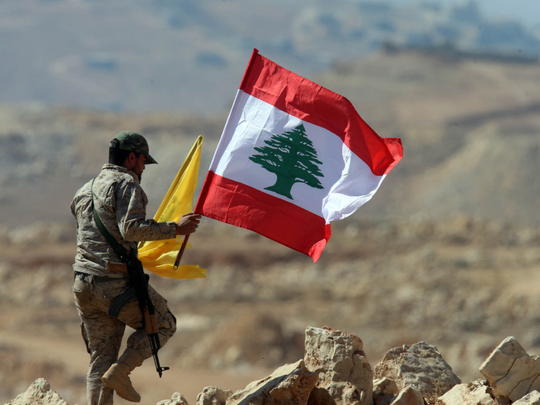
Juroud Arsal, Lebanon: The barren, rocky hilltops that form Lebanon’ss new front line with militants at the Syrian-Lebanese border were tough to capture and send supplies to.
Hezbollah commander Hajj Abu Ali says the experience could prove useful in future battles.
Military jeeps and four-wheel-drive trucks make a slow, bruising progress up newly bulldozed dirt tracks to the mountains near the Lebanese town of Arsal to ferry food and supplies to forces there as fighting rages in the valley below.
“Each battle has its own difficulties,” Abu Ali said, standing on a bombed-out hilltop bunker captured from Al Nusra Front militants in the area known as Juroud Arsal.
This is the latest front for Lebanon in its battle with militants to secure its border with Syrian. Hezbollah has been on the forefront of the battle and has made rapid advances against Al Nusra Front since launching the offensive jointly with the Syrian army on Friday, aiming to clear militants out of their last border foothold.
Mortar fire pounded targets in the valley and jets struck on the Syrian side of the border during a media trip to the area on Tuesday. Plumes of grey smoke towered into the sky.
“What is tough in some battles is that areas are densely populated, with many civilians. Here you can shell more freely, it’s open and there aren’t many people. But the terrain is the difficult bit — it’s hard to cover ground, and we have to open new roads as we go along,” Abu Ali said.
Since the operation began, Al Nusra Front has almost been vanquished, and the next target is a pocket of territory held by Daesh militants.
As Hezbollah battles militants in this latest offensive, the Lebanese army has adopted a defensive posture guarding the nearby town of Arsal. A big recipient of US and British military support, it has not taken part.
But the battle has been hard fought, mainly because of terrain that was long an ideal base for Al Nusra Front — Al Qaida’s former Syria branch and now leader of Islamist alliance, Tahrir Al-Sham — as well as for Daesh militants and other insurgents.
On this particular hilltop, militants had barricaded themselves behind sandbags and dug trenches into the hard stone ground. “It was easy for them to dig in here and shoot at whoever raised their head coming up the hill,” Abu Ali said.
Hezbollah had lost fighters that way, he said.
“We dealt with it using artillery and air strikes. We found eight (insurgent) bodies here. Others fled from the area, some on motorbikes.”
A blackened stove, an upturned coffee jar and a shredded green tarpaulin roof cover were the only signs left of Al Nusra militants.
Abu Ali said the fight to capture the surrounding hilltops began at dawn on the first day of the operation and lasted 11 hours. Ten Hezbollah fighters were killed, he said.
Security sources say some two dozen Hebollah fighters and nearly 150 militants have been killed overall.
At a checkpoint further back from the front, Hezbollah fighters urgently waved through an ambulance with blacked out windows returning along the same bumpy dirt track, signposted “to Wadi Al-Kheil”, a valley recaptured on Monday.
Tanks, tents and a field clinic sat in the shade of apricot trees nearby.
Hezbollah has lost hundreds of fighters including top commanders in Syria. It says the battle there is an existential one to stop extremists spreading to Lebanon. Its Lebanese critics say it has fuelled militant attacks in Lebanon.












